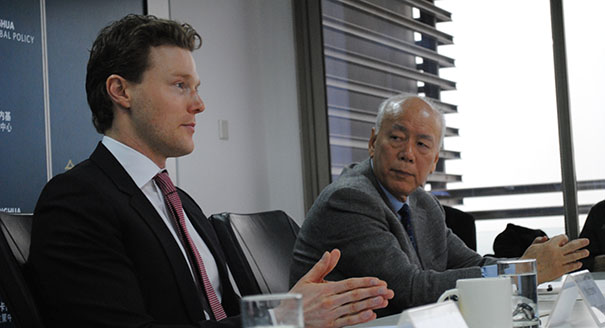Registration
You will receive an email confirming your registration.
The Joint Plan of Action signed between Iran and the P5+1 in Geneva in November 2013 marked a significant step in resolving the issue of Iran’s nuclear program. However, numerous questions remain about the implementation of the interim agreement and whether or not a comprehensive deal can be reached. Carnegie–Tsinghua’s Chen Qi hosted a roundtable discussion featuring Matthew Kroenig, an associate professor at Georgetown University, to discuss the strengths and weaknesses of the interim agreement and next steps for forming a comprehensive deal with Iran.
The roundtable also featured a former Chinese ambassador to Iran, representatives from the UK and Israeli embassies, and scholars from the Chinese Academy of Social Sciences and China Institutes of International Relations.
Five Key Takeaways
- Interim Deal Not Enough: Although the interim deal was a step in the right direction, it merely halted Iran’s nuclear program, discussants agreed. The deal failed to address many important issues, such as Iran’s ballistic missile program and the construction of nuclear weapons components. In addition, it leaves Iran’s heavy water reactor in Arak intact and concedes Iran’s right to enrich uranium. However, the P5+1 could build on this agreement to reach a more stable and long-lasting solution, discussants added.
- Terms of the Comprehensive Deal: A more comprehensive deal should force Iran to give up indigenous uranium enrichment, stated one embassy official. Permitting indigenous uranium enrichment in Iran sets a negative precedent for other countries to enrich their own uranium, thereby exacerbating the risk of nuclear proliferation. Allowing the existence of even one above-ground uranium enrichment facility leaves Iran a mere six months away from acquiring enough nuclear material to use in a weapon, which is far too destabilizing for the P5+1 to accept, the official concluded.
- Iran’s Interests: Iran is looking for sanctions relief, normalization of relations with the international community, regime stability, and security, participants said. However, the Iranian leadership feels unfairly treated by the international community, in large part due to continued uranium enrichment in neighboring countries, and sees its uranium enrichment program as integral to its national dignity. Iran will thus not give up the right of uranium enrichment in any deal, participants said.
- Possible Roadblocks: Even though the basic terms of the interim agreement have been announced, the six-month negotiation timeframe only begins if and when the terms of implementation have been fully agreed to. Hardliners in Iran have influence in the highest levels of government, and a domestic power struggle could halt progress on negotiations, discussants warned. There is concern that Iran may agree to a comprehensive deal to decrease international pressure to de-nuclearize and, after a sufficient gap, resume its nuclear program.
- Consequences of A Nuclear-Armed Iran: If Iran were to gain nuclear capability, it would lead to a more crisis-prone Middle East and increase the risk of nuclear war, participants said. One participant asserted that Israel will exhaust every possible diplomatic channel and hopes for a peaceful resolution, but added that a nuclear-armed Iran is unacceptable and that every option must remain on the table.
Discussants Included: Dana Benvenisti, Hua Liming, Matthew Jones, Li Chong, Tang Zhichao, Wang Jin
